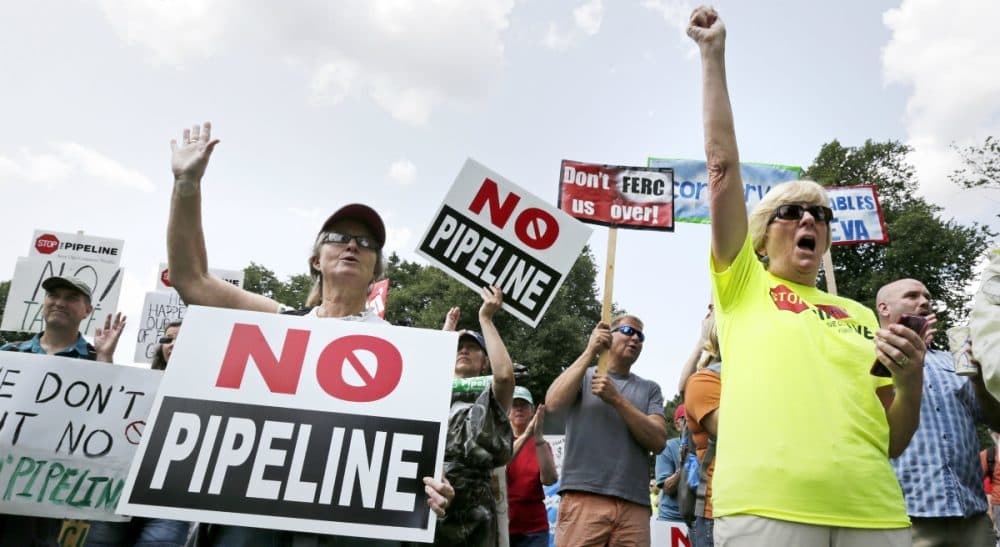Advertisement
Will Kinder Morgan's Plan To Export Natural Gas Give Pipeline Opponents Their Best Argument Against It?

From the Berkshires to Boston, activists are mobilizing against the construction of a pipeline that would bring fracked natural gas from the Marcellus Shale fields of Pennsylvania to New England. It’s a chess match of politics, propaganda and grassroots democracy. The board is now set for some crucial moves.
One of the key players in this game is Kinder Morgan, the operator of the country’s largest pipeline network. They want to build a high-pressure pipeline from upstate New York, through western Massachusetts into southern New Hampshire, and finally back to Dracut, Massachusetts. The project, named Northeast Energy Direct (NED), has the support of a moneyed consortium of utilities and businesses.
There's no shortage of arguments against the proposed pipeline. It would slash through woodlands, in some places clear-cutting a swath up to 150 feet wide.
But there’s a robust resistance. A coalition of citizen groups called Mass Pipeline Awareness Network has led the way in blocking the pipeline’s approval. At every public hearing and town hall meeting, coalition members and other local organizations have marshaled vocal opposition. They’ve carried the signs, written the letters, called the talk shows and tirelessly lobbied the legislators.
There's no shortage of arguments against the proposed pipeline. It would slash through woodlands, in some places clear-cutting a swath up to 150 feet wide. It would carve up conservation land and could seize private property by eminent domain. High-pressure pipelines are known to explode, and when they do, it can be devastating. Compressor stations located along the pipeline’s route present their own set of environmental hazards, including venting of gases and excessive noise. New gas infrastructure would push the region’s future energy mix toward more carbon emissions and away from clean renewables.
And even the very need for the pipeline is disputed. A study commissioned by the Massachusetts attorney general’s office late last year concluded that the region’s demand for electricity could be met without new pipelines.
But the key question that activist groups are now pursuing is whether the gas carried by the NED pipeline is likely to be exported to other countries.
Kinder Morgan has been reticent about the likelihood of the pipeline being used for exporting gas, saying only that the ultimate destination of the gas was not for them to decide. Still, they know quite well that the fracking boom in the Marcellus Shale has glutted the domestic gas market and depressed prices. And they know that U.S. gas prices have fallen to about a third of what they are in Europe.
So it would not make sense for Kinder Morgan to build a $5 billion pipeline just to meet New England’s needs. It's basic economics. The oversupply of gas in the U.S., in combination with strong demand in Europe, creates a business imperative to design NED with capacity for export.
Energy analysts are predicting an abrupt shift in the international natural gas market — the U.S. will soon become a net exporter. The first tankers carrying exported liquefied natural gas (LNG) from the lower 48 states will sail from a facility in Louisiana this winter. The NED pipeline would fit neatly into a corporate strategy of expanding presence in the nascent LNG export market. Both the US Department of Energy and the Canadian government have licensed a firm in Nova Scotia to import gas from the U.S. for export to Europe, that project being just one of several proposed in the Maritimes. NED would be a key link in the shortest path from the Marcellus Shale to Europe.
The question of exporting natural gas is particularly pointed because electricity ratepayers may be asked to pay a tariff, essentially a rate hike, that would cover the utilities’ cost of long-term contracts for capacity on the proposed pipeline. Without the unprecedented long-term contracts, it’s not clear that Kinder Morgan could obtain the financing or federal approvals it needs to move the project forward. Effectively, electric utilities would use the tariff to pass along the construction costs of the pipeline to consumers under the rationale that it would simply be part of the cost of transporting fuel to New England power plants.
'While the pipeline companies are coyly avoiding the subject, it appears clear that their strategy includes exporting gas on pipelines paid for by New England electric consumers.'
Greg Cunningham, director, Conservation Law Foundation's clean energy program
“These proposed pipeline expansions will be used for portions of only 30-50 days a year over the next 15 years and remain idle for the remaining 300-plus days of the year, unless an alternative market is available,” says Greg Cunningham, the director of the Conservation Law Foundation’s clean energy program, which has been actively opposing the pipeline proposals before state and federal commissions and in court. “While the pipeline companies are coyly avoiding the subject, it appears clear that their strategy includes exporting gas on pipelines paid for by New England electric consumers.”
The developers have pitched the pipeline as a public good, to be financed by ratepayers, while at the same time contriving a profitable private export business. The conspicuous unfairness of the situation hasn't gone unnoticed. Bills are pending In both the Massachusetts and New Hampshire legislatures that would explicitly prohibit tariffs to fund any gas pipelines that are connected to export terminals.
The game may be far from over, and the victor still uncertain. But the dubious prospect of a corporate export business built around a pipeline funded by what is effectively a tax casts a long shadow over the public perception of the project. If the aforementioned bills become law, or regulators nix the tariff idea altogether, it could prove to be the checkmate that the anti-pipeline movement has long sought.
